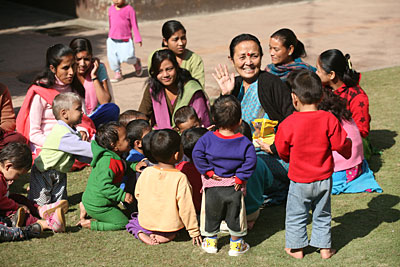Anuradha Koirala started Maiti Nepal with two rooms in 1993. Seventeen years later, Maiti Nepal has outreach in 29 districts, and a global network of supporters. The institution is at the forefront in rescuing and rehabilitating victims of trafficking and has rescued over 12,000 girls so far, including12 girls from Kuwait and Saudi Arabia recently. CNN has recognised Koirala's contribution to combating trafficking by choosing her as one of its top 10 CNN Heroes 2010. CNN Heroes is an effort to honour people who have made a commendable contribution to 'change the world' and this year received over 10,000 submissions from over 100 countries. Koirala talked to Nepali Times on her receiving the award and on what has been achieved in the fight against trafficking in Nepal.
How did Maiti Nepal come into existence? 
The problem of trafficking is not a modern problem in Nepal. After democracy was established in 1990, people did start talking about trafficking and domestic violence. But the talks were not translated into actions, and this frustrated me. With my own income as a school teacher, I helped eight women open small shops. These women were victims of domestic violence and were forced to beg because no one would give them work. Eventually the network grew and UNICEF decided to support us. Then with a group of 210, comprising students, jounalists, lawyers, nurses and policemen, we started an awareness campaign in seven villages that were most vulnerable to trafficking. That's how Maiti Nepal started.
Having worked in this area for 17 years, have you noticed changes?
First of all, trafficking exists as an issue in the public eye. The attitude towards trafficking and its victims has changed; the police are more sensitive during interrogations. Policymakers consider this a crucial issue and even though there is much to do on the implementation part, political parties have at least included combating trafficking as part of their agenda. The government has endorsed��������5 September as anti-trafficking day. Another important change is that now, traffickers are convicted; Maiti Nepal alone has helped convict 496 traffickers. The judiciary hands down verdicts quicker now, which has made conviction an easier task. The source areas for trafficking have also changed because the level of awareness has risen.
Does society accept returnees more easily now?
The parents of the girls have always been happy to welcome their daughters back home. When it comes to society, it has nothing to say if the girl is economically empowered. Which is why we value the training we give to these girls so that they can earn a living.
Have there been changes policy-wise? What changes are necessary?
There haven't been significant policy changes, partly because we haven't had a stable government in years. Trafficking takes place because of lack of education and employment opportunities, and gender disparity. Education is still not free in the villages and as a parent one sees more value in educating the son rather than the daughter. The government has to make education free and compulsory, fining those who don't educate their children. Then the government can develop life skill training to address the problem of unemployment. The government also needs to open shelter homes. As an organisation we can do little, but the government has a wide reach and capacity.
How did you feel when you were recognised internationally by CNN for your work?
This recognition reflects Nepal's unity in fighting trafficking. I felt like my responsibilities have increased, and that there is still a lot I need to do.
Will this award make a difference?
Maiti Nepal's work is to rescue and rehabilitate victims of trafficking. This award is a global recognition of efforts in Nepal to combat trafficking. International help like this will pressurise people here to further work in this field.
What is Maiti Nepal's ultimate aim?
My wish is to close Maiti Nepal as soon as possible because it will mean that trafficking has been completely eradicated in Nepal. It is shameful that Nepal is party to one of the top three crimes in the world. The day I can close
down Maiti Nepal will be my happiest day.
READ ALSO:
Mumbai's shame, PAMELA SCIANTARELLI and EUGENIA GABELIA


